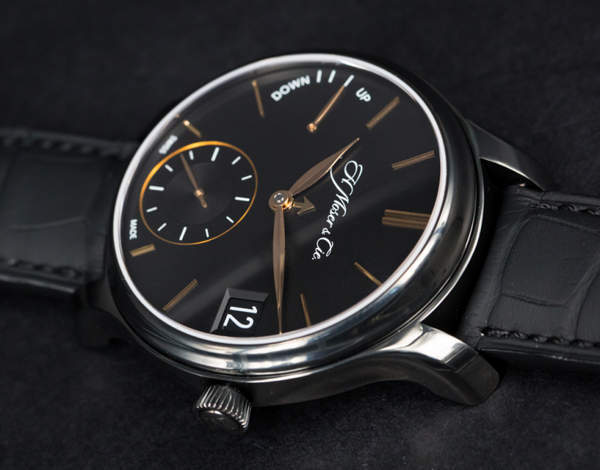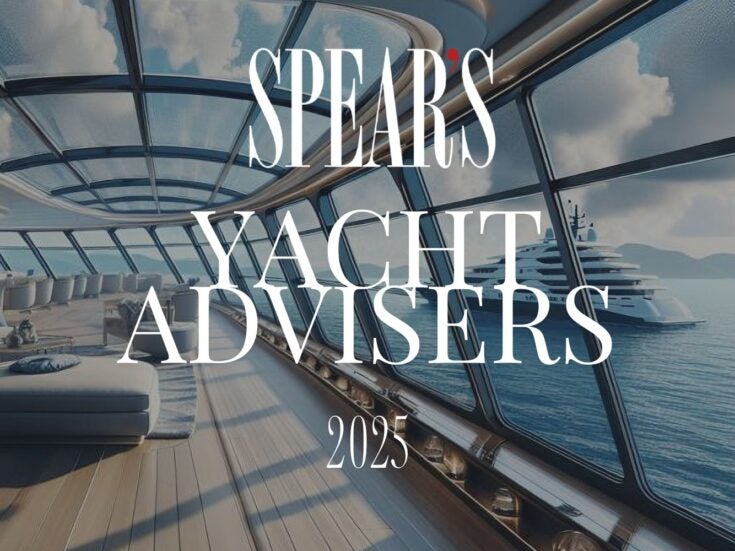

The symbolism was entirely accidental, but it was nevertheless hard to resist: looming outside the luxuriant merry-go-round that is Geneva’s Salon Internationale de la Haute Horlogerie, the watch trade show that takes place each January, were several large billboards showing a picture of the Titanic sailing towards its iceberg against a fiery sunset. These were advertising a forthcoming exhibition at Palexpo, the SIHH venue, but given the grim faces on many watch business insiders that week, you’d have been forgiven for thinking there was another meaning.
The reason: four days before the start of the SIHH, the watch industry — and indeed Swiss industry in general — was hit amidships by an iceberg of its own, put in its way by the Swiss National Bank. The sudden, unexpected removal of the cap that had for three years kept the Swiss franc pegged to the struggling euro sent Switzerland’s currency soaring, while the euro plunged. Currency exchanges collapsed into insolvency; Nick Hayek, president of Swatch Group (owner of Breguet, Omega and Longines among others), described the decision as a ‘tsunami’ unleashed on Switzerland’s export industry. One watch company CEO I spoke to likened it to being ‘punched in the stomach, stabbed in the back and having your legs kicked out from under you, all at once’. Within days, brands including Cartier, Jaeger-LeCoultre and Patek Philippe raised their prices in the eurozone.
Edouard Meylan, the 38-year-old CEO and owner (with his family) of boutique watchmaker H Moser & Cie, reacted in time-honoured style: by writing a letter. He penned an open missive to Thomas Jordan, president of the SNB, spelling out with measured sarcasm the potential consequences of the move for a company like his, which with 55 employees making just 1,000 watches a year markets itself under the tagline ‘Very Rare’. ‘Let me make my appeal clear to you, on behalf of the many small and mid-size businesses that employ so many Swiss people,’ he wrote. ‘I trust you have a strong plan that will help all of us make it through with you over the long term. Because otherwise, along with many other wonderful Swiss creations, H Moser watches may become very, very, very rare.’
Should any such plan have materialised, it probably wouldn’t have worked as well as Meylan’s. His letter went viral. The H Moser brand has become more visible than it ever was, and demand for its watches has leapt. ‘We’ve definitely felt that what was a problem may have turned into an opportunity,’ Meylan says. ‘February was actually the best month ever for us in terms of sell-out.’
Nevertheless, Meylan is still scathing of the bank’s decision. He admits the currency cap was a false situation that at some point would need to be alleviated, but the timing of the announcement, and the lack of any kind of warning or attempt to prepare the market, left a bad taste. Whereas other potential threats to the watch industry are uncontrollable, this felt like an attack from within.
‘Like every issue you need time to adapt and to stabilise, and the way they did it created a lot of uncertainty,’ Meylan says. ‘It’s a loss of trust in certain institutions. They take decisions considering speculators rather than entrepreneurs and industries. At the end of the day we’re talking jobs here, not guys speculating on currencies.’
Meylan, the scion of a family whose watchmaking roots go back generations, is a passionate and inventive entrepreneur in a luxury industry beset by staid, conservative thinking. With an MBA from Wharton under his belt, followed by a few years nursing a start-up in the luxury tech sector and managing a watch distributor in the Far East, in 2012 he joined forces with his father — Georges-Henri, a legendary former CEO of Audemars Piguet — plus two siblings to acquire H Moser & Cie. A historic marque producing beautifully understated, technically innovative watches, it had been revived by a descendant of founder Heinrich Moser but was struggling to turn brilliant horological ideas into profit.
Meylan is proud to state that 90 per cent of an H Moser watch is created in Switzerland. It’s a far higher quotient than for many brands that state ‘Swiss Made’ on the dial, for which the benchmark was recently raised from 50 to 60 per cent in an effort to protect Swiss craft from the flood of cheaper parts from the Far East. Still, Meylan suggests that Swiss Made, and the ecosystem of independent workshops and suppliers that support it, is a strength in trying times.
‘The best chance we have in the watch industry is Swiss Made — it protects us in a way, because we’re all in the same boat,’ he says. ‘I’ve seen some of our suppliers working very hard indeed to get their costs down since January, and since almost all of our parts come from Switzerland that’s good for us.’
Since the dramas of January the euro has regained some value against the franc, and despite the long faces sales were reported to be relatively strong at the SIHH. Indeed, there are greater storms the watch industry is facing. The collapse of the Russian market has seriously impacted many brands at the very high end, while China’s recent cutting of its economic growth target will be further cause for consternation — China accounts for a good quarter of the global market for Swiss watches, but business has slowed there considerably in the past two years.
What no one knows is the impact the Apple Watch, and its smartwatch brethren, will have. The year’s other big watch fair, Baselworld in March, saw a scramble from several major brands to jump aboard the wearable tech bandwagon.
Meylan, though, has his own views on the subject. In early March, H Moser & Cie announced a smartwatch of its own; this turned out cheekily to be a new version of the minimalist masterpiece that first put the brand on the map, the Endeavour Perpetual Calendar — a watch that, as the brand pointed out, is as smart as they come. Meylan has little truck with those blinking in Apple’s headlights and rushing out smart-ish Swiss watches. ‘It’s really an opportunity — there’s a huge generation of people right now who read the time on their phone, and to colonise their wrist with a smartwatch is the first step to haute horlogerie. I’m going to buy an Apple Watch — it’s a great tool. But we don’t produce tools — we produce emotion.’
One rather sobering thought, though. Switzerland’s nightmare decade, the 1970s — when Japan’s cheap electronic timepieces overran the market for Swiss watches — had one serious aggravating factor. Switzerland’s biggest market then was the US, and the dollar collapsed just when Japan’s new-fangled quartz watches proliferated. What’s referred to in Switzerland today as the Quartz Crisis was not merely a revolution in wrist technology, it was a currency crisis too. Remind you of anything?
> The flurry of London watch boutique openings continues apace. Something the capital has surprisingly lacked thus far has been a serviceable shop for Jaeger-LeCoultre, but in May JLC will get a proper flagship at 13 Bond Street, in a space formerly occupied by Montblanc.
> The watch event of the spring will be Patek Philippe’s occupancy of the Saatchi Gallery from 27 May to 7 June. For those even half-interested in horology, this is an absolute must. It encompasses the whole history of timekeeping, along with many of the rarest and most important watches created in Patek Philippe’s history.






